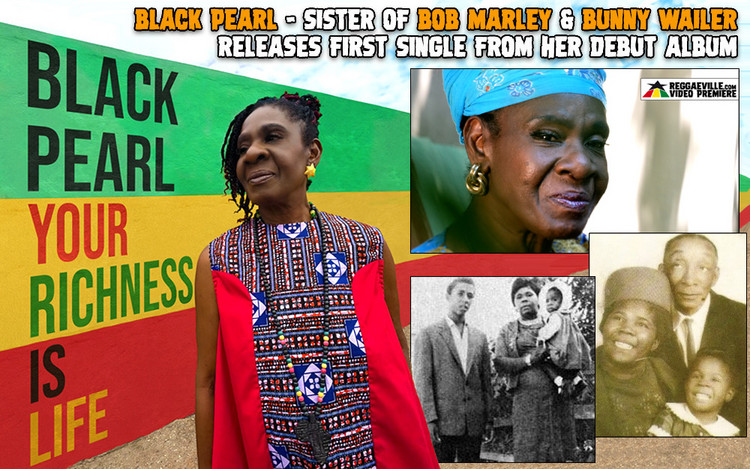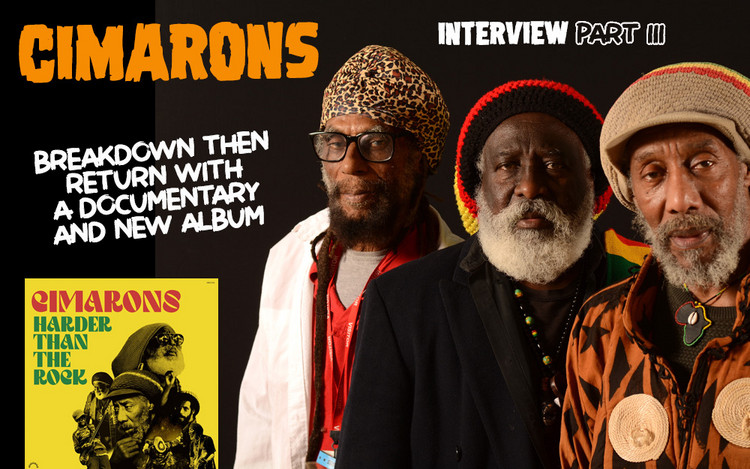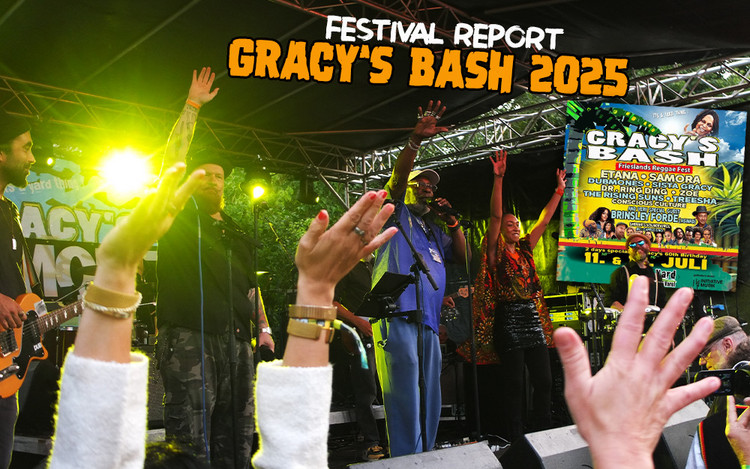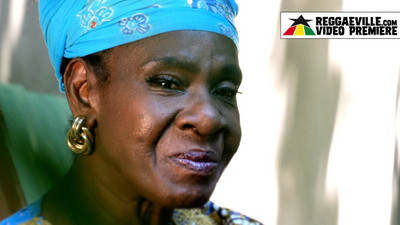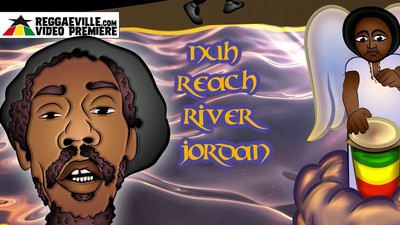Tasman Jude ADD
Interview with Tasman Jude
10/07/2014 by Justine Amadori Ketola
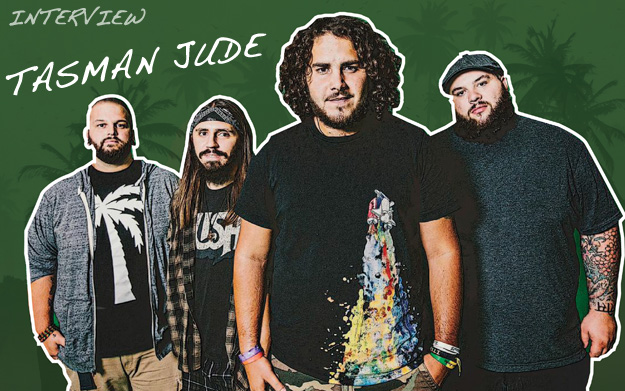
Reggaeville linked Tasman Jude via Skype when they were on tour in Saskatoon, Saskatchewan. Present were Caleb Hart (lead singer), Al Peterson (guitarist), Derek Wilder (bass), and Adam Paananen (percussion). They were formed in Peace River Country in northern Alberta, in a town called Grand Prairie. The lead singer ended up there after his parents sent him from his native Tobago to remove him from the gang life he was involved in shortly after a narrow escape from a violent demise. Known as BraveHart during his time there, 23 year-old Caleb Hart was a dancehall artist and started performing at age 4. He made an impact on stages throughout the country as a teenager before restarting life in Canada.
You are based up in Peace River country in northern Alberta, How did you get into Rasta culture?
Caleb: I am from Trinidad and Tobago, I grew up in Tobago which is a very small island, it has always had more of a Jamaican culture, I want to say, not as Trini of a culture, it’s very small islandy-much like a lot of Caribbean islands, whereas Trinidad has its own culture and its very diverse though. Of course soca music is a big thing there right? Even though I enjoy soca and lots of my friends are soca artists and stuff like that, I’ve just had this love for reggae music, since I was a very small boy playing football, you know, soccer. Ever since then it always intrigued me. I went from gangs and such to positivity and the love of God changing my life. So I wouldn’t say it is just Rastafarianism, its more of that unified movement that no matter your religion is, no matter what your color of your skin is, no matter where you are from, whether Canada, Trinidad & Tobago, Jamaica, Germany, the States, it doesn’t matter, you know? Reggae music unites people and that’s our biggest goal, to spread love, joy freedom, unity and peace through music.
Well said, I would have to agree. It is not that everybody there in the Caribbean is Rasta, but it is the philosophy, the struggle, the culture of the Diaspora, people who are interested in the well-being of humanity. I have found people to be so open and welcoming, so interested and aware of the world out there and how you can play a part in the conscious movement. You have a busker type of style, a folk style, songs that are shorter for the most part, and that encourage people to sing along. Have you done busking or street performing?
Al: We did one busker style performance in Burnaby, a small town in British Columbia. That was the first time we did street busking and I guess our style or our set up is a desire first off for it to be easy to tour, and second our songs are really easy to sing along with, we enjoy getting people to sing along, we enjoy drawing people in, an we want people to feel like they are not just our songs, they are their songs to sing along with too.
How did this idea come about that stripped down reggae could be a thing to pursue as a group. Although Caleb has been doing reggae since he was quite young as a musician, but you all seem to be very accomplished musicians in your own right. How did you find each other?
Caleb: I was working at an authentic Mexican taco stand, which in Grand Prairie, Alberta there are not lots of, I was obviously as I do every minute of my life, singing, cooking tacos, and he showed up for some tacos once. We started talking he (Al) picked up on the accent, and talked about the genre and he was like. ‘Man I love reggae, we should jam sometime’. I thought ‘What? I just found somebody in northern Alberta, Canada that loves reggae’, then nothing happened for a year and a half. He became my friend and I would serve him tacos, and he would do his rock and roll shows with a band and I would do motivational speaking mixing hip hop and reggae round Native reserves and schools and stuff, but just on my own part time. One day we kind of decided, we really need to do something, but more than just jam. I won’t say we were like depressed per se in the sense, but it was time to do what we love the most. So we got up on a stage at an open mic, we made up three songs, fifteen minutes before on the couch, slash on the stage. I had no idea what he was going to say, keep in mind I have never heard him play reggae guitar before. The next thing you know, more than a hundred college kids stopped playing ping-pong, stopped playing pool, and their eyes were on us. They had some great acts before us, but they are college kids, they were doing what they do, but we had, over a hundred of them just enthralled, not one person was distracted, they were over a hundred of them and they were just looking at us. When we got off the stage, it was like an uproar, they were like, ‘Who are you guys, where can we buy your CD?’ It was the first time I had ever heard him play or he heard me sing through a microphone. That was it, I went on Facebook, made a page and within two days we had 100 likes, within one week we released a single and within two and a half months we released our first EP. We have been touring ever since, 220 shows in 20 months.
Way to go! The release is beautifully recorded how did you go about recording what is your process like or has it been over the years?
Al: First we panicked (We need new material!) then we begged our friends to help us.
Caleb: We do have our good friend Nathanael Sterr from Dove Fire Studios who helped us out a lot, engineered and co-produced the album, and then it is a self-produced album, so basically we produced it and then Luke Dowler out of Montana, good friend of ours, family as we say, mixed it for us. Actually can hear a remix of our song Rejoicing which is on our EP, but he mixed the album and we just think he did a bang-up job. And Indie Pool out of Toronto mastered it. So it was a team effort from around the globe, ‘cause we have drums from Trinidad and Tobago, stuff like that.
What is the origin of the name Tasman Jude?
Caleb: It’s a very deep and dear meaning to us. There was a fifteen year old girl, on the streets of Montreal, Quebec, Canada and she wasn’t living the most ideal life, she was a teenager and she got pregnant. She moved back to Calgary, Alberta where here family was. Instead of aborting the baby, she had the child and put it up for adoption, but before she put it up for adoption, she named the child Tasman Jude. That child was adopted and renamed Al Peterson, so he is sitting right here and he plays guitar, writes the songs and all that jazz, so Tasman means ‘of great faith’ and Jude means ‘he who is praised.’ We believe Jah gave us these great gifts to bless the world with, so when I found that out and we were talking about this band, it was like, ‘Done, decided’. He was not for it, he was like, ‘Oh, ah’, and I was like ‘Bro you can’t be serious, this is so amazing, it’s so much deeper.’ Cause I mean its not just our genre of music that allows us to be positive and stuff, we want our lifestyle to be the validity as you will hear in our song, Fugue State. That’s really deep to me, and dear to us as we were starting it we were making music as a band, but as a movement. So he gave in, he said ‘OK for a few months, we will change the band we’ll find a better name.’ I said, ‘Uh huh, sure, OK’, and of course there is no changing the name now, it’s gone.
The actual song Tasman Jude has a rapid fire lyric with a tribal feel, North African, Flamenco tempo or Klezmer style tempo, how did you come up with that song?
Al: I came up with the basic riff, and we threw over the basic dubs with a soca beat, I was thinking very world music and Eastern Europe, Flamenco, that type of style and when Caleb heard it he was like, ‘That’s soca, so Trinidad and Tobago.’ I kind of meshed it in there, I would say now it is more soca than anything else. For a long time that is what we called it, “Soca”. We played so often that we were writing songs on stage, free styling, like making it up on the spot. Then of course we got this guy last year (points to Adam) Adam, our percussionist. He went from being like, you know he has played drums in rock bands, he’s a multi-instrumentalist, it’s his first time playing congas and djembes and stuff, especially professionally. He just skyrocketed cause he is brilliant. Once he started playing that beat on the djembe, it rose inside of me, (plays out the soca rhythm). He laid the djembe tracks before any other track was laid, no guitar, no nothing, no scratch vocals. He was like ‘I will lay it’ because Al wasn’t there at the time. So if you listen to specifically the djembe tracks, you will be mind blown, cause he laid it without anything just the metronome.
Another song with great percussion elements is Yawheh, do consider yourselves messianic Jews?
Caleb: The lyrics are definitely Messianic, I had my life transformed five years ago by Yawheh, he is the reason I sing, the reason I inspire, the reason I am inspired. So I was like, when Al first started playing that we were jamming with our friend John who actually plays congas on that track. That’s what came out, and I never suppressed that. When something comes out, we record it. We record and release. So it is beautiful that it is a song that expresses, ‘I am thankful for everything that you have done.’ The lyrics is my heart.
Canada is very supportive of reggae music, even now Magic is running the airwaves, what has the reception been like for you in your country, when you sing of Fugue State, what type of restrictions are you singing about in relation to your creativity and futility. I am aware of Canada providing grants for artists, and directly supporting them. Can you speak to how Canada uplifts you as reggae artists?
Al: With Fugue State that song was written to not necessarily reflect on music, it was kind of started by this idea of forgetting your purpose, forgetting your passion, and not really living for what you are better for. Pursuing things that you are passionate about, you are driven by so, that was kind of where we came at that song from. Canada has always been great to us, cause our career took off pretty fast, and we have been very blessed by being here. When we went to Australia the reception there was phenomenal, it was off the charts so we have been able to see the different cultures react differently to live music. Canada has been fantastic.
Let’s talk about Australia for the band, you have toured there, have you been getting a lot of airplay? How did that come about, is it a really important market for you?
Caleb: Our friend who co-wrote our song Mountains from our EP El Norteño he was living in Australia last year. He went to this festival, Easter Fest and he was like, ‘Tasman Jude has to play here.’ It’s the largest all-ages festival in the country. He told Easter Fest about us and told us about Easter Fest. So I put an artist application in last October thinking like, ‘even if they say yes, how the heck are we getting to Australia?’ right. We got accepted and I was like ‘Oh’, I mean who knows how many so many submissions and we got accepted. And it wasn’t like we got accepted and we did not hear from them, we were emailing and they were like, ‘We’re sorry we cannot help you more financially, but we guarantee that if you come, we’ll make it worth your while.’ I was like ‘What does that even mean, how much is it going to cost?’ So I sat down with Al and our manager Andrew and I was like, ‘So this is what’s happening but the odds are like minus 704, as cold as an Albertan winter.’ But you know what? We had this crazy idea.You know what? Tasman Jude family loves us, why not give them the opportunity to invest into our lives. Within three weeks, $10,000 dollars was donated to us.
Al: Including $1500 dollars from the City of Grand Prairie.
That’s what I am talking about, the Canadian government supports the artists.
Caleb: There’s lots of bands in this world, but I cannot emphasize enough how important the message of positivity is so much more vital to us than you dancing. We want you dancing because things are breaking off of you, you are becoming more free as a person, as a spiritual being, not just cause its music playing. ‘Cause it is moving your heart and that is what is making you dance. So that being said, our little Western Canadian fan base…we had not even gone out to Eastern Canada yet, the furthest we we had gone was Saskatoon, and then Alberta, BC, and then 9 thousand and some dollars came in, and next thing you know we are on a plane, to Australia to play the largest all-ages music festival in Australia. We get down there, they provide us hotels, they treat us like kings, we played five shows in four days. They really like us, every where they had a chance they put us on the schedule. They didn’t dishonor their word which is very dear to us right? By the end of the weekend we had the winner of The Voice of Australia dancing, the semi-finalist. They are now good friends of ours. New Empire, which is a huge band there, 2000 people jam packed in this tent, dancing and singing along to Tasman Jude and we’re just like, what?
Al: It got really strange, we couldn’t walk 200 feet down the road without somebody screaming our name, or asking for our picture. All of a sudden we went from nobodies to Coldplay level, we were like ‘Whoa what just happened?’
Caleb: Keep in mind we had no bass, two djembes, three vocals and an acoustic guitar. So it’s like, raw, busking style as you said. So now we are looking forward to the new year when we are hoping to go back. Now we have a bass player and it let’s us, especially guitar and vocal, just release, we are really excited about that.
Caleb you have such a huge voice have you had any vocal training?
Caleb: No, I have not really had vocal training, experience is so much more impactful than schooling in so many ways. I am not talking about every subject. But vocals, you have to sing and sing and sing and allow people to criticize you. I did not always have this voice. Ask Al. A year ago, I didn’t sound like this. You could hear the potential, I thought a year ago I was the best I could be. Now it keeps getting better so I have opened up my mind, I’m like ‘OK there can never be the best, I can always keep improving.’ That blew my vocal chords open, so now I can go high, I can go low, I can go fast, I can go slow. It is my biggest joy and I think that is the most important thing.
How are you doing with the current mission, with the new the release and how are you getting the word out?
Caleb: If someone is really interested there are lots of ways to find out, our website our Facebook. I have on our Facebook I have on our Twitter you have to see us live to understand. Even though we were listening to the album, CD-wise for the first time yesterday while driving, we all looked at each other, we were like, ‘Good job boys.’ In some ways it feels like this album represents us, however, that being said, last week we did our hometown CD release to kick off our tour. Nothing can touch that night, I’ll cry if I keep talking about it it was absolutely phenomenal. The love there was through the roof, the stars and up to another galaxy and back. It was phenomenal, so no matter where we go, if people are watching and reading, we will be wherever you are one day. Our music says it all, whether it is the instrumental track in the beginning (of the album) or the end, our music really does speak for our hearts. I can say that as the lyricist, the boys agree, I write the lyrics cause there is something there, cause if I write something and someone will say, ‘ya but this though.’ We will talk over half an hour over two words, not whether to drop an and, but to get to the meaning.
Al: I had written the chorus to Follow Your Dreams but it was literally like two or three words, it gave the impression that I didn’t think about, Caleb thought about it, as we can’t say that, we don’t think that, so we revamped it. We are very particular with the message we put out there, and our legacy will be turn out. If we all die in a car accident tomorrow, these songs will outlive us and outshine us. They are carrying our message, the music has to carry our message.
You are planning to go to Trinidad, do you have set locations you are planning to perform in, or is it more of a promotional tour?
Caleb: We have set places where we will perform already, we are trying to get about five confirmed, you know one in the south of Trinidad, one in the West, one in the North and two in Tobago. Then in between that we are going to do a couple schools, some motivational speaking, maybe it will just be me, I have no idea. Most of all, I am most excited, the biggest crowd I have ever performed for was 12,000 people opening for Jah Cure and Glen Washington in Tobago, that was in May. It wasn’t with these guys. It didn’t feel right, even though I still have the wristband on, its an accomplishment cause I look up to those two guys. But I was up there and people were like ‘you killed it’ but I was like ‘yeah’ but there was something missing, from that moment on I was like, ‘I have to take Tasman Jude, not just Bravehart to the Caribbean.’ Now that we are going, people are stoked, I have never seen so many people from my island sharing stuff and commenting and stuff. Before we have been touring Canada so often they were viewing and not interacting but now a radio station talked to me, I am going to get newspaper interviews and all that jazz. It’s a huge blessing so it is more than promotional, honestly we will probably end up losing money. But even that is more important to us, it is not just breaking into an industry, its also going to give back to the country that bred me and I have the support of the brothers in my band which is amazing to me.
The live connection is so much a part of how fans actually connect to the music. So you are in a hotel room now in Saskatoon on tour?
Caleb: We are going to play Ontario, Sault Ste Marie, Thunder Bay and Toronto, we are on a six week cross-Canada tour. For this tour we got a publicist because of course we believe in the album, sows knew it was going to be more than just going across the cold country even in the fall. So now we have new material out on iTunes, and our EP when we were two months old, without two of the bandmates out of four of us, let’s get into this. Pita Pit, Grand Prairie, do you know what a Pita Pit is? It’s a franchise, they helped us sponsor the publicist and the album, so it is really helping us a lot.
So they end up on your posters and in your publicity?
Caleb: Their logo is on the back of the album. We are hoping that that grows, it is in Trinidad and Tobago and Australia as well, Pita Pit, ironically.
It’s healthy living and we are all on that path, its amazing cause we love it, we think its delicious, it really helps in that sense. So we are really grateful for the sponsorship, so we have a publicist for this tour, a couple booking agents have been helping out for the tour as well.
The freshness, the enthusiasm the newness of a band on its way to a bright future is very evident in this interview. With such a positive outlook and prolific creativity combined with a strong, practical music business strategy, they are destined for greatness and longevity.
FREE DOWNLOAD - EVERY BREATH




